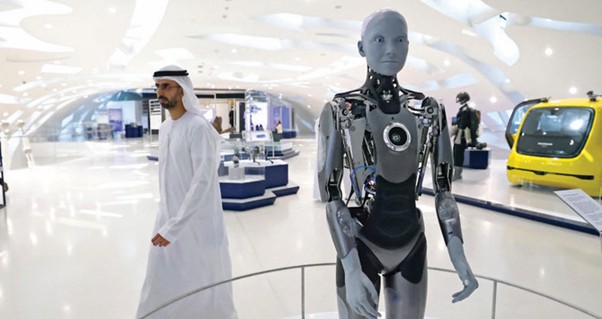December 12, 2024
Beirut
The Arab Federation for Digital Economy, a member of the Executive Bureau of the Forum of Specialized Arab Unions at the League of Arab States, participated in the workshop organized by the United Nations Economic and Social Commission for Western Asia (ESCWA). The workshop, held via videoconference, brought together a group of experts and officials from various sectors and international and regional institutions to discuss the various dimensions of artificial intelligence and its impact on Arab economies and sustainable development.
Mr. Ayman Mokhtar Ghoneim, Assistant Secretary-General of the Arab Federation for Digital Economy, delivered a speech in which he emphasized that developing a large Arabic language model represents a strategic necessity for the Arab world in light of the rapid digital transformations the world is witnessing. He explained that this project is not merely a technical initiative, but rather a long-term investment in the future of the Arabic language and its role on the global digital scene. He pointed out that Arabic, spoken by more than 400 million people worldwide, possesses a rich cultural and historical heritage that qualifies it to be a major player in the digital economy. However, Arabic digital content represents only a small percentage, not exceeding 3% of the total global content, highlighting the need to enhance the presence of the Arabic language in the digital world.
In his speech, he also referred to successful models for developing AI technologies in the Arab world, such as the Falcon 40B model developed in the UAE and the Saudi “Allam” initiative, which have proven their ability to improve the use of AI in the region.
Ghoneim concluded by emphasizing that creating a large Arabic language model requires concerted Arab efforts to overcome the technical and financial challenges associated with this project. He emphasized the importance of establishing a joint Arab fund to support this model and provide the necessary funding. He added that regional cooperation can reduce costs and enhance the efficiency of resource use, enabling Arab countries to fully benefit from AI technologies, whether in education, media, or government sectors.
Highlighting the Diverse Aspects of Artificial Intelligence
In addition to Mr. Ayman Ghoneim’s speech, the workshop included various speeches delivered by prominent figures from ESCWA, the League of Arab States, and the International Telecommunication Union. These speeches addressed the importance of establishing comprehensive governance frameworks for artificial intelligence, emphasizing the risks associated with the unregulated use of these technologies.
The workshop also discussed the impact of artificial intelligence on education, reviewing international experiences, such as those of Finland and the United States, in using these technologies to provide personalized education tailored to each student’s abilities. The workshop emphasized the role of the large Arabic language model in providing innovative educational solutions that enhance Arabic language learning and develop students’ skills in scientific subjects.
Discussion Sessions and Key Outcomes
The workshop featured several discussion sessions that focused on pressing issues such as artificial intelligence governance, infrastructure challenges, and ways to enhance cooperation between Arab countries. Participants emphasized the importance of providing qualified human resources to support these projects through specialized training programs and scholarships. Speakers also called for strengthening partnerships with global technology companies to provide modern technical infrastructure and accelerate the pace of development.
Final Recommendations: A Roadmap for the Future
At the conclusion of the workshop, a set of recommendations was agreed upon to support the development of artificial intelligence in the Arab world. Participants called for the establishment of regional alliances to develop a large Arabic language model, along with the establishment of regulatory policies and ethical frameworks that ensure the safe and fair use of these technologies. They also emphasized the need to support research and development in this field through the allocation of financial resources and shared infrastructure.
The Arab Federation for Digital Economy’s participation in this workshop comes within the framework of its ongoing commitment to strengthening regional and international cooperation and consolidating its leadership role in driving digital transformation in the Arab world, contributing to achieving sustainable development and economic prosperity.











